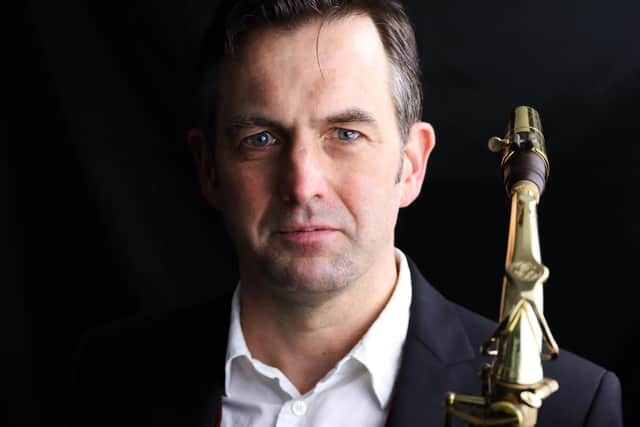Christian Forshaw: “I heard the sax in a classical context and my world expanded”


Like most saxophonists of his generation, Christian Forshaw wasn’t exactly encouraged in his preferred choice of instrument. “I was a clarinettist first, because everyone told me at school you needed to play that before the saxophone, which is completely misinformed,” says the Yorkshire-born soloist. In the end, a burning curiosity led him to borrow a saxophone from the school cupboard. He was instantly hooked.
Now one of the UK’s leading composer/performers with a stream of albums to his name, Forshaw went on to study at the Guildhall School of Music with groundbreaking saxophonist John Harle, performed with American experimentalist Moondog (aka the late Louis Hardin), Brian Eno and the Michael Nyman Band, and by his late 20s was appointed a professor at the Guildhall.
Advertisement
Hide AdAdvertisement
Hide AdLater this month he’s in Scotland to perform music from his latest album, Historical Fiction, as part of a wider-based residency at Sir James MacMillan’s Cumnock Tryst festival, which this year also features guest artists Karen Cargill, piano duo Steven Osborne and Paul Lewis, the Hebrides Ensemble and Lomond Brass.
Forshaw’s album, released this week on his own Integra label, debunks another misconception, that saxophone automatically equals jazz. His first teacher in Harrogate reckoned if you wanted to be a classical musician, you played clarinet; to be a jazz musician you played saxophone. A young, impressionable Forshaw paid heed.
“Then I heard John Harle presenting the saxophone in a classical context and all of a sudden my world expanded,” he recalls. “I was torn between these two things, but was hearing something that made me think how I could develop a sound that was uniquely mine. As a sax player your identity is very much tied in with the repertoire you choose to play. That’s what grabbed me about it.”
As did playing for Eno. “It’s the way he thinks and can steer groups,” Forshaw recalls. “Look at the albums he’s produced – U2’s Joshua Tree and David Bowie’s Berlin Trilogy – and you don’t hear anything in common between them. What he brings is a way of getting people to challenge and push themselves.”
Historical Fiction, which Forshaw performs in Cumnock on 2 October with singer Grace Davidson and organist Libby Burgess, comes from his early experience as a boy chorister. It’s filled with his own beguiling arrangements of early vocal music, the combination of Davidson’s ultra-pure soprano voice and Forshaw’s dreamy saxophone enveloping the likes of Orlando Gibbon’s The Silver Swan or Purcell’s Fairest Isle with a warm, intoxicating glow.
“Grace and I have worked together for 17 years. This music evolved out of that partnership,” he explains. “She always approaches the sung line from an instrumentalist’s viewpoint, whereas I’ve always approached the saxophone from a vocal perspective. It’s good we overlap and meet somewhere in between.”
Forshaw’s other key Cumnock appearance – he’ll also head up an improvisation/composition session with local school musicians – introduces a brand new project, Drop, Drop, Slow Tears, with vocal ensemble Tenebrae and its director Nigel Short. “We were supposed to do the first performance over a year ago at St John’s Smith Square as part of its Holy Week Festival, but the pandemic put paid to that,” he says. Again the vocal emphasis is on early music – Gregorian chant to Tallis and Gibbons – but juxtaposed with Forshaw’s own reflective compositions.
Advertisement
Hide AdAdvertisement
Hide AdComposing arose out of necessity, he explains. “On leaving college, I realised I wasn’t actually finding the music I wanted to play. It didn’t exist. I had a choice: commission some, or do it myself. The same unwillingness to compromise persuaded him to turn down a five-album deal from Sony BMG and set up his own label. “I knew what was going to happen. They’d just get me to churn out five albums playing anything that might work commercially, but which might not have suited me, and might not have been things I was proud of. I’ve seen the way that’s happened to other artists.” In every aspect of his career, Forshaw calls the tune.
The Cumnock Tryst runs from 30 September until 3 October, www.thecumnocktryst.com. Christian Forshaw’s album Historical Fiction is released on 17 September on Integra. Details at www.christianforshaw.com
A message from the Editor:
Thank you for reading this article. We're more reliant on your support than ever as the shift in consumer habits brought about by coronavirus impacts our advertisers.
If you haven't already, please consider supporting our trusted, fact-checked journalism by taking out a digital subscription at https://www.scotsman.com/subscriptions